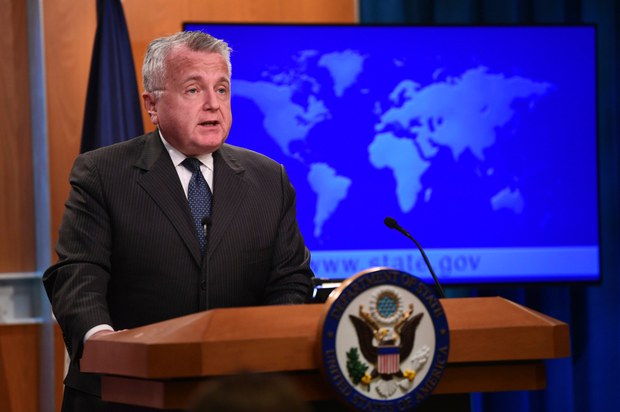US Report Takes Aim at Region’s Human Rights Practices
2018.04.20
Washington
 Acting U.S. Secretary of State John Sullivan announces the release of the 2017 Country Reports on Human Rights Practices in Washington, April 20, 2018.
Acting U.S. Secretary of State John Sullivan announces the release of the 2017 Country Reports on Human Rights Practices in Washington, April 20, 2018.
In releasing its latest annual report on human rights conditions worldwide, the U.S. State Department on Friday criticized South and Southeast Asian governments for abuses ranging from extrajudicial killings to placing limits on citizens’ rights to free speech.
The department’s 2017 Country Reports on Human Rights Practices specifically cited Bangladesh, India and the Philippines for extrajudicial killings. It targeted Indonesia for arbitrary or unlawful killings by government security forces, and blamed Malaysia for degrading treatment by security officials that led to death in some cases.
The report also noted a sharp rise in extrajudicial killings in the Philippines tied to President Rodrigo Duterte’s war on drugs. The state department published its report on the same day Duterte spokesman Harry Roque, in a rebuke of a critical statement from the European Parliament, denied that the Philippine government had engaged in extrajudicial killings of drug suspects.
“The government investigated a limited number of reported human rights abuses, including abuses by its own forces, paramilitaries, and insurgent and terrorist groups,” the report stated. “Concerns about police impunity increased significantly following the sharp increase in police killings.
“President Duterte publicly rejected criticism of police killings, but he said authorities would investigate any actions taken outside the rule of law.”
The report did not blame Thailand for any killings, but cited the kingdom for excessive use of force by its security officials.
The United States releases its human rights report annually to promote and defend the nation’s founding principle that each person is endowed with inalienable rights, Acting Secretary of State John J. Sullivan said.
“States that restrict freedoms of expression and peaceful assembly; that allow and commit violence against members of religious, ethnic, and other minority groups; or that undermine the fundamental dignity of persons are morally reprehensible and undermine our interests,” Sullivan wrote in the preface to the report.
Civil liberties violations
Bangladesh, the report noted, restricts civil liberties including freedom of speech, press, and the activities of nongovernmental organizations. It said there was a lack of freedom to participate in the political process and discrimination based on gender, religious affiliation, sexual orientation and gender identity due to a lack of accountability.
In recent years in Bangladesh, secular bloggers, writers and publishers have been killed in attacks by religious extremists. In one attack, U.S.-Bangladeshi citizen and secular writer Avijit Roy was killed and his wife seriously injured by machete-wielding assailants as they left a major book fair in Dhaka in February 2015.
Bangladesh’s neighbor, India, was blamed in the report for violence and discrimination based on religious affiliation, sexual orientation, and caste or tribe, due to a similar lack of accountability.
In January, police arrested 300 for protesting the killing of a member of the low-caste Dalit community.
In its section on Indonesia, the report highlighted blasphemy, defamation and decency laws that limited freedom of expression in 2017. The country also criminalizes same-sex sexual activities at the local level and violence against lesbian, gay, bisexual, transgender, and intersex persons, the report said.
In January, police in Indonesia’s Aceh province arrested 12 transgender people, cut off their hair, took them to a police station and ordered them to roll around on the ground, run and chant loudly, witnesses said.
The report went on to criticize Malaysia for arbitrary arrests and detention of government critics, as well as limiting freedoms of expression including of the press.
Earlier this month, the Malaysian parliament passed a bill to punish people who spread “fake news,” despite complaints from the opposition that it would be used to go after critics of Prime Minister Najib Razak in the run-up to the May 9 general election.
In Thailand, the State Department pointed to how the military government had issued decrees last year limiting freedom of speech, assembly and the press.
In January, seven Thai pro-democracy activists were charged with sedition and violating the country’s strict public gathering law by leading about 100 people in a protest calling for elections later this year.







